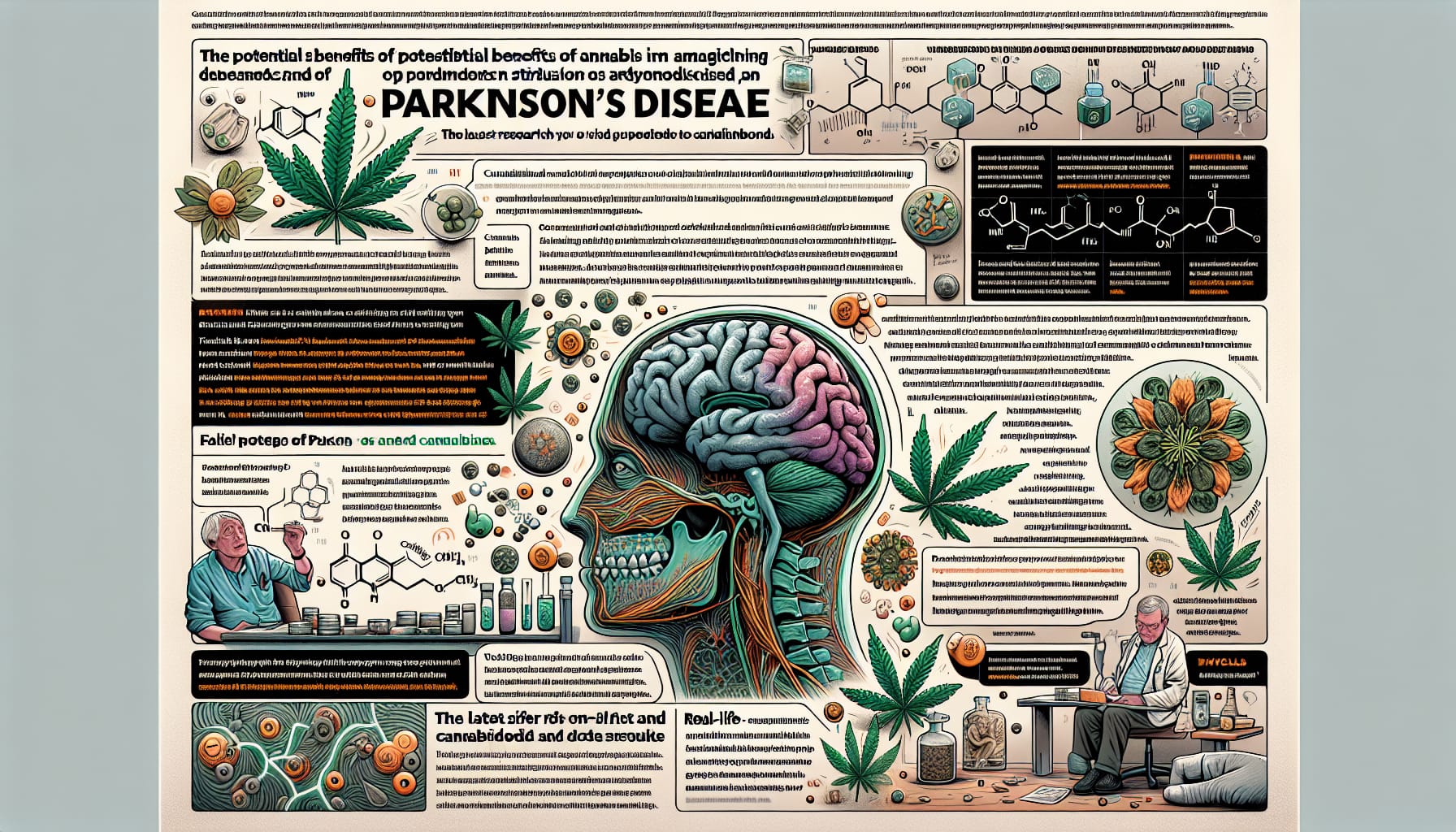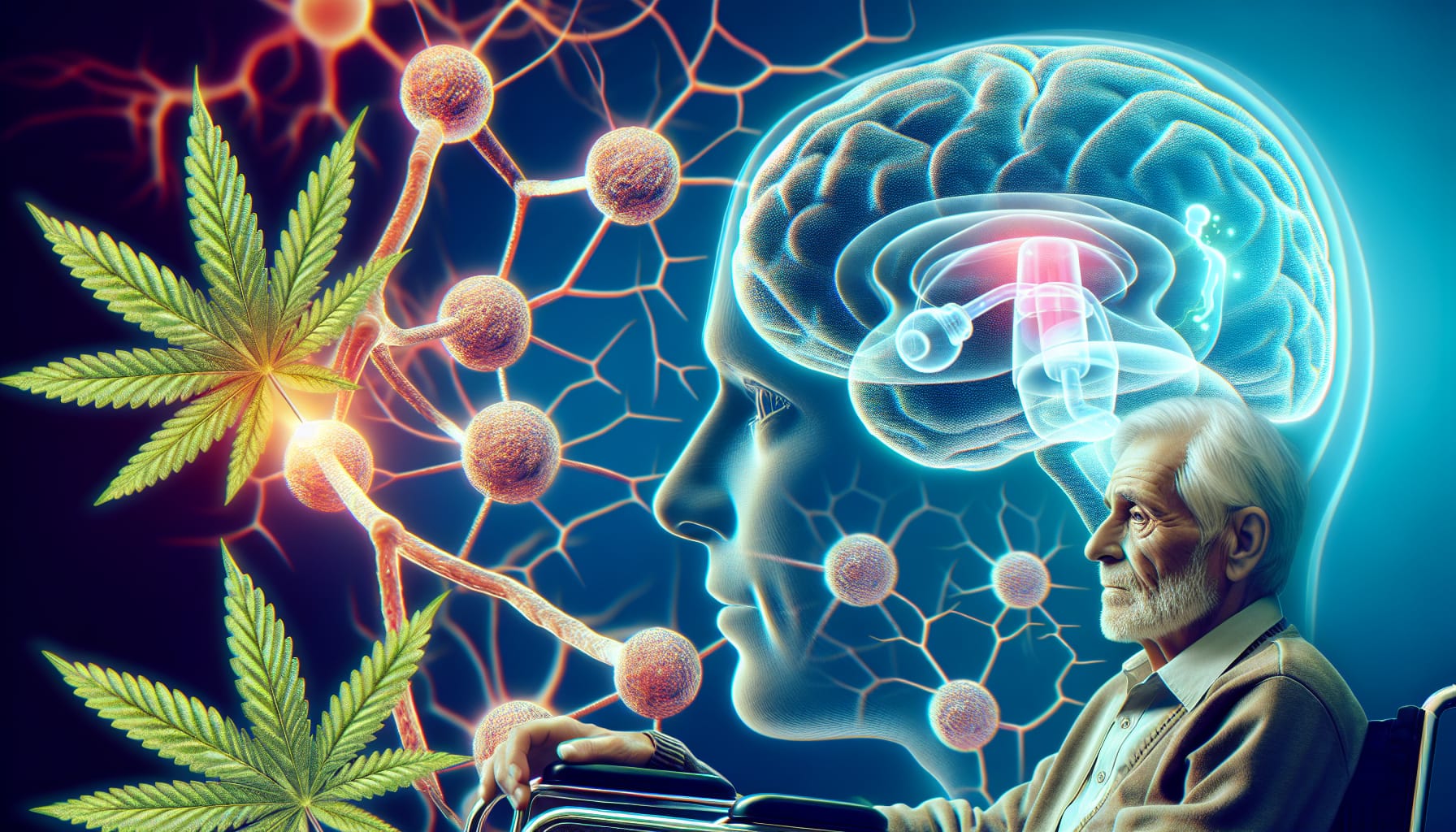In this article, you will explore the intriguing connection between cannabis and the symptoms of Parkinson’s disease. With an open and friendly tone, we will navigate the potential benefits and effects of cannabis on those living with Parkinson’s disease. By delving into the latest research and personal anecdotes, we aim to paint a comprehensive picture of how cannabis may offer relief and improve the quality of life for individuals impacted by this neurological condition. So, let’s embark on this insightful journey together and uncover the potential healing properties of cannabis for Parkinson’s patients.
Introduction
Welcome to this comprehensive article on how cannabis affects symptoms of Parkinson’s disease. In this article, we will explore the understanding of Parkinson’s disease and its causes and symptoms. We will then dive into the potential benefits of cannabis as a medical treatment for Parkinson’s disease, focusing on its effects on both motor and non-motor symptoms. We will also explore how cannabis can regulate mood and emotions, as well as its neuroprotective properties. Additionally, we will discuss the potential side effects and risks associated with cannabis use for Parkinson’s disease. Finally, we will explore the different routes of cannabis administration. So, let’s get started!
Understanding Parkinson’s Disease
Overview of Parkinson’s Disease
Parkinson’s disease is a neurodegenerative disorder that primarily affects movement. It is caused by the progressive loss of dopamine-producing cells in the brain, particularly in an area called the substantia nigra. This loss of dopamine leads to motor symptoms such as tremors, muscle stiffness, bradykinesia (slowness of movement), and difficulties with balance and gait. However, Parkinson’s disease may also present with non-motor symptoms such as pain, sleep disturbances, depression, anxiety, and cognitive impairment.
Causes of Parkinson’s Disease
The exact cause of Parkinson’s disease is still not fully understood, but a combination of genetic and environmental factors is believed to contribute to its development. Certain gene mutations have been identified as risk factors for Parkinson’s disease, but most cases occur sporadically without a clearly identifiable cause. Additionally, exposures to certain toxins and chemicals, as well as head injuries, may increase the risk of developing Parkinson’s disease.
Symptoms of Parkinson’s Disease
Parkinson’s disease presents with a wide range of motor and non-motor symptoms that can vary in severity and progression from person to person. Motor symptoms include tremors, muscle stiffness, bradykinesia, and problems with balance and coordination. Non-motor symptoms include pain, sleep disturbances, depression, anxiety, and cognitive impairment. These symptoms can significantly impact the quality of life for individuals with Parkinson’s disease.
Cannabis and Parkinson’s Disease
Overview of Cannabis
Cannabis is a plant that has been used for centuries for medicinal, recreational, and spiritual purposes. It contains several active compounds, the most well-known of which are delta-9-tetrahydrocannabinol (THC) and cannabidiol (CBD). THC is responsible for the psychoactive effects of cannabis, while CBD is non-intoxicating and has been attributed to various therapeutic properties.
Components of Cannabis
THC and CBD are just two of over 100 cannabinoids found in cannabis. These cannabinoids interact with the body’s endocannabinoid system, which plays a role in regulating various physiological processes, including pain, mood, appetite, and movement. Other components of cannabis, such as terpenes, flavonoids, and other cannabinoids like cannabigerol (CBG) and cannabinol (CBN), may also contribute to its overall effects.
Cannabis as a Medical Treatment
In recent years, there has been growing interest in the potential use of cannabis as a medical treatment for various conditions, including Parkinson’s disease. Preliminary research suggests that cannabis may help alleviate some of the motor and non-motor symptoms associated with Parkinson’s disease, as well as provide neuroprotective effects. However, more extensive research is still needed to fully understand the efficacy and safety of cannabis as a treatment option for Parkinson’s disease.
Effects of Cannabis on Motor Symptoms
Tremors and Muscle Stiffness
Tremors and muscle stiffness are hallmark motor symptoms of Parkinson’s disease. Studies have shown that cannabis, particularly strains with higher levels of CBD, may help reduce tremors and muscle stiffness in individuals with Parkinson’s disease. CBD has been found to have muscle relaxant properties and can potentially provide relief from these symptoms. However, it is important to note that individual responses to cannabis may vary, and further research is needed to validate these findings.
Bradykinesia and Slowness of Movement
Bradykinesia, or slowness of movement, is another common motor symptom experienced by individuals with Parkinson’s disease. Research suggests that cannabis may have potential benefits in improving motor function and reducing bradykinesia. THC, in particular, has been found to have dopaminergic properties, which means it can help stimulate dopamine receptors in the brain and enhance movement. However, more studies are needed to determine the optimal dosages and long-term effects of cannabis for improving motor symptoms.
Balance and Gait Improvement
Maintaining balance and a steady gait can be challenging for individuals with Parkinson’s disease. Although limited research exists on cannabis specifically for balance and gait improvement in Parkinson’s disease, some studies have shown that cannabinoids may have positive effects on motor coordination and balance in other conditions. Cannabis’s potential ability to reduce muscle stiffness and improve movement may indirectly contribute to better balance and gait in individuals with Parkinson’s disease. However, further research is necessary to confirm these findings.
Effects of Cannabis on Non-Motor Symptoms
Pain Relief
Pain is a common non-motor symptom experienced by individuals with Parkinson’s disease. Cannabis has been used historically for its analgesic properties, and recent studies suggest that cannabinoids may help alleviate pain in individuals with Parkinson’s disease. Both THC and CBD have shown potential pain-relieving effects, with CBD being particularly useful for neuropathic pain. However, it is essential to consider the potential side effects and individual responses to cannabis during pain management.
Sleep and Insomnia
Sleep disturbances, including insomnia, are prevalent non-motor symptoms in Parkinson’s disease. Several studies have investigated the effects of cannabis on sleep, and some have reported improvements in sleep quality and duration. THC has been associated with sedative effects, which may help individuals with Parkinson’s disease sleep better. However, it is worth noting that cannabis can also affect sleep architecture, and the optimal dosages and timing for sleep improvement are still being explored.
Depression and Anxiety
Depression and anxiety are common comorbidities in Parkinson’s disease, significantly impacting overall well-being. Cannabis’s potential to regulate mood and emotions is of great interest in managing these mental health symptoms. CBD has shown promise in reducing anxiety and has been studied for its potential anti-depressant effects. THC, on the other hand, may have mixed effects on depression and anxiety, as it can exacerbate symptoms in some individuals. Individual responses to cannabis for mood regulation should be carefully monitored, and a personalized approach is recommended.
Cognitive Function and Memory
Cognitive impairment, including problems with memory and executive functions, is another non-motor symptom associated with Parkinson’s disease. While THC has been found to have short-term memory impairing effects, CBD has shown potential neuroprotective properties that may help preserve cognitive function. Some studies suggest that CBD may even have a positive impact on memory and attention. However, more research is needed to understand the long-term effects of cannabis on cognitive function in Parkinson’s disease.
Regulating Mood and Emotions
Elevating Mood
One of the potential benefits of cannabis in Parkinson’s disease is its ability to elevate mood. CBD has been studied for its potential anti-depressant and anxiolytic effects, which may help improve overall mood and well-being. Additionally, THC, when used in moderation, may also induce feelings of euphoria and relaxation, contributing to an improved mood. However, it is crucial to understand individual sensitivities and reactions to cannabis, as excessive THC consumption may lead to anxiety or worsen depression in some individuals.
Reducing Anxiety
Anxiety is a common comorbidity in Parkinson’s disease, and cannabis’s potential as an anxiolytic agent is of great interest. CBD has demonstrated anti-anxiety properties and has been studied for its effects on social anxiety disorder. It is believed to modulate serotonin receptors in the brain, which may contribute to its anxiolytic effects. However, individual responses to cannabis for anxiety reduction can vary, and it is important to discuss with a healthcare professional before incorporating cannabis into anxiety management strategies.
Managing Depression
Depression is a prevalent mood disorder in Parkinson’s disease that can significantly impact quality of life. While the potential anti-depressant effects of cannabis have been explored, the relationship between cannabis and depression is complex. Some individuals may experience relief from depressive symptoms with the use of cannabis, while others may find that it exacerbates feelings of sadness or lethargy. It is crucial to approach depression management with cannabis on an individual basis and seek professional guidance.
Neuroprotective Properties of Cannabis
Anti-inflammatory Effects
Inflammation plays a role in the progression of neurodegenerative diseases like Parkinson’s disease. Cannabis has been found to have anti-inflammatory properties, primarily attributed to its cannabinoids like CBD. CBD interacts with receptors in the endocannabinoid system, which can modulate immune responses and reduce inflammation. These anti-inflammatory effects may potentially slow down the progression of neurodegeneration in Parkinson’s disease. However, further research is needed to fully understand the mechanisms and long-term effects of cannabis on neuroinflammation in Parkinson’s disease.
Antioxidant Effects
Oxidative stress is another contributing factor to the development and progression of Parkinson’s disease. Cannabis contains compounds with potent antioxidant properties that can help neutralize free radicals and reduce oxidative damage. Both THC and CBD have been shown to have antioxidant effects, primarily through their interactions with the endocannabinoid system. These antioxidant properties may help protect against further damage to neurons in Parkinson’s disease. However, more research is needed to determine the optimal dosage and long-term effects of cannabis as an antioxidant treatment.
Protection Against Neural Degeneration
Another area of interest regarding cannabis and Parkinson’s disease is its potential to protect against neural degeneration. Preclinical studies suggest that cannabinoids may have neuroprotective effects, including the regulation of neural cell survival and death. Additionally, cannabinoids have been explored for their ability to enhance neuroplasticity, which is the brain’s ability to adapt and reorganize in response to injury or disease. These neuroprotective properties may help slow down the progression of Parkinson’s disease. However, more research and clinical trials are needed to validate these findings.
Potential Side Effects and Risks
Psychiatric Symptoms
While cannabis has shown promise in managing symptoms of Parkinson’s disease, it is essential to consider the potential side effects and risks associated with its use. In some individuals, particularly those who are more susceptible to psychiatric symptoms, cannabis may trigger or worsen anxiety, paranoia, or psychosis. It is important to be aware of these potential psychiatric side effects and to monitor individual responses closely when using cannabis as a medical treatment.
Cognitive Impairment
Cannabis use, especially THC-dominant strains, can have short-term cognitive impairing effects. This includes impairments in memory, attention, and executive functions. These cognitive effects may be more pronounced in individuals with Parkinson’s disease, who may already experience cognitive impairment as part of the condition. Therefore, it is important to consider potential cognitive side effects when using cannabis as a medical treatment for Parkinson’s disease, particularly when driving or operating machinery.
Cardiovascular Concerns
Cannabis can have acute cardiovascular effects, such as an increase in heart rate and blood pressure. While these effects are generally mild and transient, individuals with pre-existing cardiovascular conditions should exercise caution when using cannabis. Cannabis use has also been associated with an increased risk of heart attacks, although this risk appears to be higher in older individuals and those with pre-existing cardiovascular disease. It is recommended to consult with a healthcare professional before using cannabis for Parkinson’s disease, especially for individuals with cardiovascular concerns.
Dependency and Addiction
Another concern with cannabis use is the potential for dependency and addiction. While cannabis is generally considered to have a lower risk for dependence compared to substances like alcohol or opioids, some individuals may develop a psychological or even physical dependence on cannabis. Additionally, individuals with a history of substance abuse or addictive behaviors may be more vulnerable to developing problematic cannabis use patterns. It is important to use cannabis responsibly and seek professional help if dependency or addiction becomes a concern.
Routes of Cannabis Administration
Smoking and Vaporizing
Smoking and vaporizing are two common methods of cannabis administration. Smoking involves inhaling the combustion products of cannabis, while vaporizing heats the cannabis to a temperature that releases the cannabinoids without combustion. These methods provide rapid onset of effects, making them suitable for individuals who require immediate symptom relief. However, it is important to note that smoking can have adverse effects on lung health, and vaporization devices should be used responsibly and according to manufacturer guidelines.
Oral Consumption
Oral consumption of cannabis includes ingesting it in various forms such as oils, capsules, tinctures, or edibles. This method provides a slower onset of effects but allows for longer-lasting relief. Oral consumption is suitable for individuals who prefer a more sustained and controlled effect. However, it is important to be mindful of proper dosages and be aware that the effects may differ between individuals due to variations in metabolism and absorption.
Topical Applications
Topical cannabis products, such as creams, lotions, or patches, are applied directly to the skin. These products are primarily used for localized symptom relief, such as pain or muscle stiffness. Topical application allows for targeted relief without the psychoactive effects commonly associated with cannabis. While this route of administration may have limited effects on non-motor symptoms, it can provide localized relief and may be a preferable option for individuals who want to avoid systemic effects.
Conclusion
In conclusion, the potential use of cannabis as a medical treatment for Parkinson’s disease is a topic of growing interest. Research suggests that cannabis may have beneficial effects on both motor and non-motor symptoms associated with Parkinson’s disease. From alleviating tremors and muscle stiffness to improving sleep, mood, and cognitive function, cannabis has shown promise in providing relief and enhancing the overall quality of life for individuals with Parkinson’s disease. However, it is important to consider the potential side effects and risks associated with cannabis use and to approach its use under the guidance of a healthcare professional. As research continues to explore the true potential of cannabis in treating Parkinson’s disease, it is essential to keep an open mind and stay informed about the latest developments in this field.





